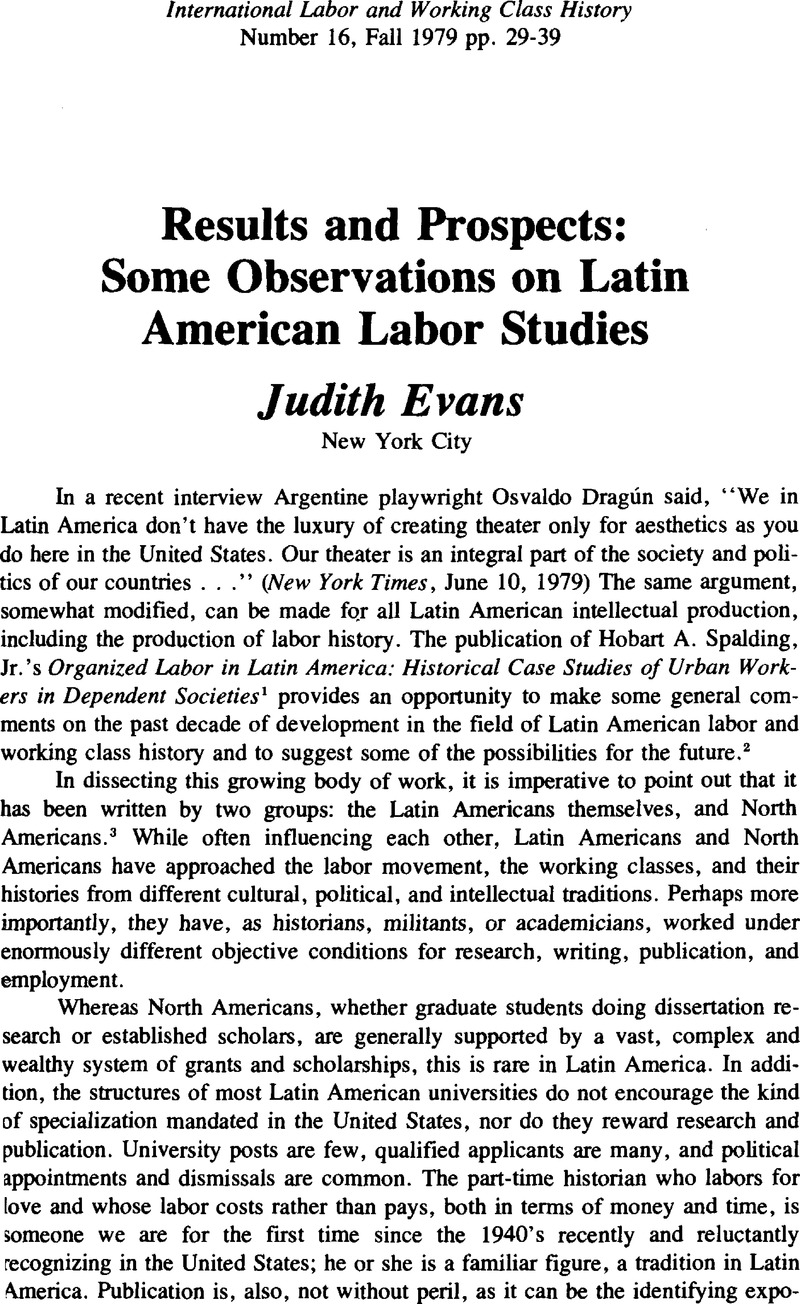Article contents
Results and Prospects: Some Observations on Latin American Labor Studies
Published online by Cambridge University Press: 16 December 2008
Abstract

- Type
- Essays
- Information
- Copyright
- Copyright © International Labor and Working-Class History, Inc. 1979
References
NOTES
This article is dedicated to the Grupo ICTUS of Chile, with gratitude for the courage of all those who “han siempre estado aqui.” I would also like to thank Betsy Blackmar for her confidence and support, Steve Brier, who for once straddled the fence, and Iris Zavala, who provided the context.
1. New York: Harper and Row, 1977.
2. Although it would have been enormously useful to have punctuated or footnoted this essay with full bibliographical information to support my observations, that task was beyond my time capacities. That information is, however, readily available. The Handbook of Latin American Studies lists, often with short annotations, a wide range of publications in English and Spanish. The University Microfilms International bibliography on Latin America and the Caribbean is a compilation of most completed dissertations. The American Historical Association publishes a list of history dissertations in progress. The Latin American Studies Association conference program also gives a broad idea of what younger scholars are doing.
3. There is also a growing body of scholarship on Latin America by German and French scholars. The British have had a traditional intellectual, as well as economic interest in Latin America. While in many ways their work could be included in my admittedly simplified schema, the differences in intellectual perspective and educational institutions argued for their exclusion.
4. For the best known works in which the influence of Commons can be detected, see: Alexander, Robert J., Organized Labor in Latin America (New York: The Free Press, 1965)Google Scholar; Davis, Stanley M. and Goodman, Louis Wolf, Workers and Managers in Latin America (Lexington, Mass.: D.C. Heath and Co., 1972)Google Scholar; Payne, James L., Labor and Politics in Peru: The System of Political Bargaining (New Haven, Conn.: Yale University Press, 1966)Google Scholar; Tannenbaum, Frank, Peace by Revolution: Mexico After 1910 (New York: Columbia University Press, 1966)Google Scholar; and Urrutia, Manuel, The Development of the Colombian Labor Movement (New Haven, Conn.: Yale University Press, 1969).Google Scholar
5. Petras, James. “U.S.-Latin American Studies: A Critical Assessment,” Science and Society, 32 (Spring, 1968), 148–68.Google Scholar
6. Instrumental in disseminating dependency theory among U.S. Latin Americanists have been the Los Angeles based journal Latin American Perspectives and the publications of the North American Congress on Latin America.
7. Spalding, x.
8. To cite one example from my personal experience: in 1976 the Urugayan government conducted a population census. Because the loss of population suffered by Uruguay had definite political causes, there was reported to have been sabotage through non-participation. In addition, newspaper articles pointing out the roots of the out-migration were censored. A recent, and marvelous book, Let Me Speak (New York: Monthly Review Press, 1979) is based on the oral history of Domitila Barrios de Chungara, leader of the Housewives' Committee in the mining regions of Bolivia. In it she cites several instances when mobilizations to protest prices or wage policies followed a release of statistical information.
9. Anyone who knows him will recognize the wit of Paul Worthman.
10. It should be noted that work on the colonial period is a caveat to almost all of the generalizations about the field that are being suggested here. Social history, use of new methodologies, and incorporation of theory have been more in evidence for longer among considerable groups of young colonialists. The rewards have been rich. I would suggest several reasons for this. There are rich and available sources. The temporal distance has made it a less hazardous field politically. Most importantly, it has long been thought that the wealth generated by the Spanish exploitation of the New World was vital to the development of capitalism. Consequently, leftist colonialists were plugged into what is affectionately known as “The Transition Question,” a Marxist theoretical debate of long standing.
11. Troncoso, Moises Poblete and Burnett, Ben G., The Rise of the Latin American Labor Movement (New Haven, Conn.: College and University Press, 1960)Google Scholar; Alexander, Robert J., Organized Labor in Latin America (New York: The Free Press, 1965)Google Scholar; Alba, Victor, Politics and the Labor Movement in Latin America (Stanford, Cal.: Stanford University Press, 1969).Google Scholar
12. Alba, 341.
13. Ibid.
14. Spalding, 252.
15. James, Daniel, “Dependency and Organized Labor in Latin America,” The Radical History Review, 18 (Fall, 1978), 159Google Scholar. For recent general discussions on dependency theory see The Insurgent Sociologist, 7, (Spring, 1977); Cardoso, Fernando Enrique, “The Consumption of Dependency Theory in the United States,” Latin American Research Review, 12, (1977)Google Scholar; Latin American Perspectives, (Spring, 1974) and (Fall, 1976).
16. Charles Bergquist, “Worker Organization in the Export Sector and Twentieth Century Chilean and Argentine Politics,” Paper given at the 1979 LASA Conference.
17. Many of the contributors to this volume are English, and much of the work is based on research on the auto plants.
18. (Amsterdam: Center for Latin American Reseach and Documentation, 1978).
19. For an introduction to the labor situation in Argentina during the 1973–1976 period, and an interview with Tosco, see Knowles, Christopher, “Revolutionary Trade Unionism in Argentina,” Radical America, 9 (05–06, 1975), 17–37Google Scholar; also, Tosco's obituary by Christopher Knowles, Radical America, 10 (03–04, 1976), 71–74.Google Scholar
20. Erickson, Kenneth Paul, Peppe, Patrick V. and Spalding, Hobart A. Jr., “Research on the Urban Working Class and Organized Labor in Argentina, Brazil, and Chile: What is Left To Be Done?” Latin American Research Review, 9, (Summer, 1974).Google Scholar
- 2
- Cited by




